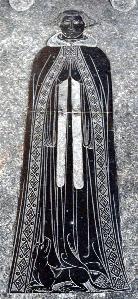The Will of Mathew de Assheton

The brass of Mathew de Assheton
Matthew de Asheton was Rector of Shillington from 1349 to 1401. He has a brass in the church where he is buried in the chancel. His will survives in the archive of the Diocese of Lincoln and was transcribed and translated in Bedfordshire Historical Record Society Volume XIV, where it is on page 104. It reads as follows
Mattyhew de Assheton, Rector of Shillington and Walpole in Lincoln and Norwich dioceses, canon of York and Lincoln, prebendary of Langtoft and Clyfton in York and Lincoln dioceses. To be buried in the chancel of Shillington church or elsewhere in the church as he shall please. To that church he leaves his ancient missal which John Wynewyk left to him by will, and a smaller noted breviary, a chasuble with two tunicles of the same pattern and a chalice which he bought from the executors of Lord John [?Smenell]. To the altar of the White Mary in the south part of the church, a plain vestment of white baudekin which he bought from the same executors. He leaves £90 that two priests may celebrate mass for his soul in that church for ten years, each to receive yearly £5. To the four orders of Friars, namely the Preachers of Dunstable, Carmelites of Hitchin, Minors of Bedford and Austins of Cambridge, £4 in equal shares. To Richard Gladyon his chaplain £2; Robert Messenger his chaplain £1; Thomas, his parish chaplain 10 shillings. To John Northern £1; William Wytbred £2; John Beston £2; John Cost £2; Peter Cook, after that he shall have satisfied the executors for £1 lent to him, 10 shillings. To John, his chamberlain £1; Richard his falconer, 31; to William Hynch, Thomas Bayly and Peter his baker, each one mark; and to Beatrice his laundress, 6 shillings, 8 pence. To Thomas Warner, bailiff at Walpole £1; for distribution among his lads, according to the length and quantity of their service, £5. For expenses on the day of his burial and distribution to the poor, each £20. To his nephew Lord William de Par a gilt cup and cover given to him by the Lord Bishop of Ely and six silver plates and salt cellar, which the testator had lent to him when on a mission to Spain for the business of the late Duke of Lancaster. The residue of all his vessels to be sold and the money to be expended on the poor; in payment of his debts; and for the salvation of his father and mother Lord John Wynwyk, others his benefactors and all the faithful departed. He names as executors Master Richard Wynwyk Canon of Lincoln, Lord William de Par his nephew, Richard fitz Richard, Johon Lord of Misperton, lord John Northern and Richard Gladyon his chaplains and John Beston; who are to receive remuneration suitable to their labour. Witnesses Thomas parish chaplain, Lord Robert Messenger, William Wytbred, John Cost, John Chaumberleyn. Given at Shillington 26th December 1400.
The will was proved in February 1401. There is some evidence that Assheton was in France during the campaign of 1360 (ended by the Treaty of Brétigny in October). By 1381 he had resigned the living of Slapton [Buckinghamshire] and was instituted to Walpole [Norfolk] in 1393. John Wynwyk had become Treasurer of York Minster in 1349 and William de Par was an executor of John of Gaunt (the late Duke of Lancaster referred to – he was a son of Edward III, uncle of Richard II and father of Henry IV and he died in 1399).
A missal is a book of liturgy containing texts for celebration of the mass throughout the year. A breviary is a book containing all the texts for the services through the day. A chasuble is a kind of tabard worn over other vestments when saying mass. A tunicle is another vestment, worn beneath the chasuble. A mark was two thirds of a pound or 13 shillings and 4 pence. The William Wytbred mentioned is quite likely to be an ancestor of the Whitbread family of Southill Park.